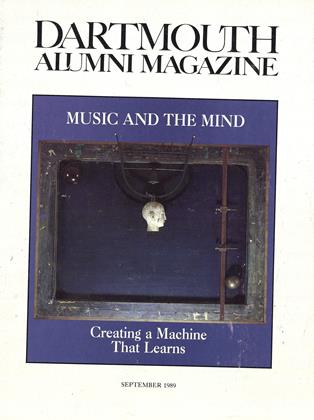When alumni talk to students they often wax nostalgic about Dartmouth traditions that failed. But for some reason they hardly ever talk about one of the College's most important and long-lived rites of passage: the comprehensive exams. From 1929 through 1968, every Dartmouth senior was given the opportunity to write down virtually everything he knew about his major in several days of three-hour sessions. A student who failed was required to pay a "suitable fee" and retake the exam a semester later in order to graduate.
The tests stand as an eloquent testament to the changing intellectual history of Dartmouth and the world. Intended to measure a student's grasp of timeless knowledge, the comps covered topics ranging from evolution to fascism, from gender relations to international relations. In the 19205, James Joyce joined Shakespeare and Chaucer in questions; in the thirties, the Far East was added to history.
Other essay questions mirrored narrower views of the world. The English-philosophy major in 1935 was asked to defend or refute the following notion: "Whenever women practice an art they reduce it to something finicking and petty. This has been conspicuously true in painting and music; it is scarcely less true in poetry and fiction."
By the 19605, the comps had become unpopular among professors, particularly those in the sciences, who argued that their fields had become too specialized for such generalized tests. In 1967 the faculty voted to make the exams a departmental option, and by 1969 they were abolished altogether. Though the daily Dartmouth reported no vigorous dissent, English Chairman Harold L. Bond expressed his regret that "there no longer is a coherent body of knowledge which can be considered comprehensive."
In the spirit of enlightened reminiscence, we offer the readers a chance to see just how well-rounded their education really was. The list of questions below, culled from four decades of comps, are just a start. Should the exam prove an insufficient challenge to your corpus callosum, we invite you to submit your own comprehensive question. The editors will judge the winning entry by its intellectual scope, its wit, and its relevance to modern society and education. Its author will receive a $1OO gift certificate from the Dartmouth Bookstore and may claim the prize through the store's toll-free number, 800/624-8800.
English Major Nancy Staab was a Whitney Campbell Intern with the Alumni Magazine last year.
 View Full Issue
View Full Issue
More From This Issue
-
 Cover Story
Cover StoryMUSIC AND THE MIND
September 1989 By Jay Heinrichs and Karen Endicott -
 Feature
FeatureSAILING FOR HOME
September 1989 By Heather Killebrew '89 -
 Feature
FeatureSon of Animal House
September 1989 By Ed. -
 Article
ArticleThe man who wrote the movie returns to find brothers in slime.
September 1989 By Chris Miller '63 -
 Article
ArticleDR WHEELOCK'S JOURNAL
September 1989 -
 Sports
SportsDartmouth's Quarterback Says No to the Baseball Draft
September 1989
Nancy Staab '90
Features
-
 Feature
FeatureThe Club Scene
Sept/Oct 2002 -
 Cover Story
Cover StoryPipes's Cinch
MARCH 1995 By Al Henning '77 -
 Feature
FeatureDartmouth's First Lady
NOVEMBER 1965 By MARGARET BECK McCALLUM -
 Feature
FeatureNew Environmental Studies Program To Be Launched in the Fall
JUNE 1970 By ROBERT B. GRAHAM '40 -
 Feature
FeatureCHAIRMAN'S REPORT 1905-1966 CAMPAIGN
NOVEMBER 1966 By Rupert C. Thompson. Jr. '28 -
 Feature
FeatureProphet of Limits
NOVEMBER 1993 By Suzanne Spencer '93



